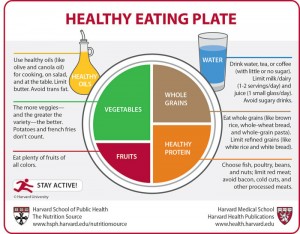Staying healthy in college: An analysis of student nutrition

I grew up on a small organic and biodynamic farm, so a healthy diet has always been part of my life. Once enrolled at Hudson Valley, I was struck by the quality of food consumed by students and began to wonder: what is our campus community eating? To find out more, I started by interviewing twenty-three students at the Hudson Valley cafeteria asking them detailed questions about their diets. Fast foods and deep fried products dominated their meals and most students were lacking fruits and vegetables. I also found that 34.8% of Hudson Valley students interviewed had skipped their breakfast due to time constraints.
Andrea Hotaling-Lizzi, catering director at Hudson Valley confirmed that time is a primary consideration in students’ choice of food. Despite the variety of healthy food choices at the cafeteria, students overwhelmingly go for the quick and easy comfort foods such as hamburgers and a side of fries. Students are looking for fast, familiar and tasty foods to eat on the run.
Hudson Valley is not alone. Malnourished students can be found across the U. S. in many universities. In a survey of six hundred college students at Oregon State University, the majority were not even consuming one serving of fruit and vegetables per day. The USDA guidelines suggest around four servings of fruits and vegetables per day. Grub Hub, an on-line ordering food service that is able to track college students’ orders, found that foods such as mozzarella sticks, cookies, general Tso’s chicken, pizza and energy drinks were the most popular among college students.
Clearly, college student malnutrition is rampant. Students, themselves, acknowledge their poor diets and 91.3% of Hudson Valley students interviewed expressed a desire to improve their nutritional health claiming that their number one challenge was time. Busy, irregular class schedules, heavy workloads, and being new to the challenge of shopping and preparing food for oneself are all obstacles college students face.
Of the 65.2% of students interviewed at Hudson Valley that did eat breakfast, many start their day on ice cream, cookies, and high-sugar cereals. These students claimed that this morning sugar gave them extra energy. However, they did not consider the crash that would occur a few hours later when they need the energy to concentrate in class.
Many studies have shown that academic performance is affected by nutrition. Dr. Philippa Norman discusses what the brain needs for academic success in her paper, “Feeding the Brain for Academic Success: How Nutrition and Hydration Boost Learning”. She explains “… that wonderful experience – when the lights go on and your student says, ‘I get it!’ – is a neurochemical process as well as an academic one. By nourishing the brain with healthy food and water, you will optimize the internal environment, enabling students to truly engage in the classroom environment and achieve their potential.”
The USDA’s food pyramid and “My Plate” are regarded as basic guidelines for a healthy diet. However, according to the Harvard School of Public Health there is intense lobbying of the USDA by large food industries that have influenced the design of the pyramid and plate to increase sales rather than consumer health. As an alternative, Harvard created their own pyramid and plate based on the research they conducted during the past twenty years.
Norine Masella, Assistant Professor of Nursing at Hudson Valley, notes that when schools go through budget cuts, health and nutrition classes are some of the first to get cut. As a result, academic performance is suffering. Philippa Norman stresses that “nutrition and hydration are part of a foundation for healthy learning. Helping students make healthier choices is an essential part of their education and well-being.” A possible solution that could improve students’ diets is to have a mandatory health class for freshmen just as we have the mandatory college forum class at Hudson Valley. Nutrition classes could raise student awareness thereby improving the health of a student over the course of their entire life. By developing good eating habits in college, students can improve their current and long-term health as well as their more immediate concern: academic success!
Grace Harrison is a freshman at Hudson Valley. This article summarizes a research paper she did for Dr. Peter Sawyer’s Honors Seminar class. The full paper can be viewed at http://bit.ly/18GnlMo. Grace can be contacted at g-harrison1@hvcc.edu
